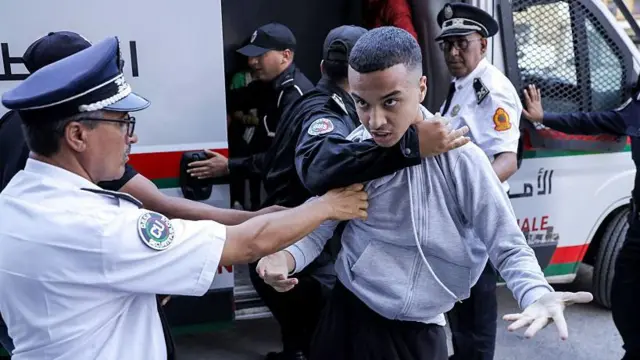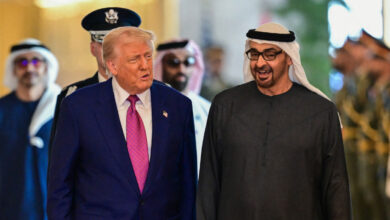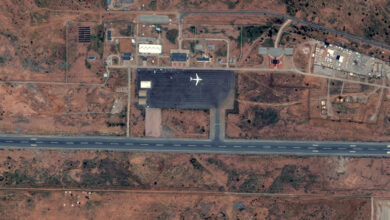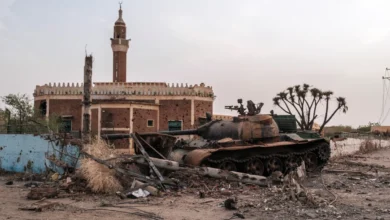Report: The UAE’s Intervention in Morocco: Suppressing Protest to Protect Normalized Rule

Morocco, a kingdom that once prided itself on balance and gradual reform, now faces swelling unrest. Youth across cities have taken to the streets under the banner “GenZ 212,” demanding health care, education, jobs, and transparency. In the last week, at least three protesters have been killed during confrontations with security forces, drawing the names of Agadir and Lqliâa into the headlines.
While much attention has centered on domestic drivers, misgovernance, corruption, youth disillusionment, there is mounting suspicion of a foreign hand at work: the United Arab Emirates. The hypothesis is bold: that Abu Dhabi is intervening covertly to support a regime in Morocco already aligned with Israel, and to suppress any uprising that could challenge normalization or embolden other dissenters in the Arab world.
Normalization as Leverage
Morocco formally normalized ties with Israel in 2020. Since then, its regime has positioned itself as a bridge between North Africa and the Gulf-Israeli axis. Because of this alignment, the Moroccan monarchy has become more dependent on external partnerships to buttress its domestic legitimacy.
In this context, street uprisings pose not just a domestic threat — but a regional one to the narrative of gradual Arab-Israel reconciliation. The UAE, which invests heavily in supporting normalization across the Middle East and North Africa, has a vested interest in keeping Morocco’s regime stable and silence protests that could cast doubt on the viability of pro‑Israel alliances.
Patterns from Elsewhere
Though direct evidence remains limited in public sources, the UAE’s playbook is clear from other theaters:
In Sudan, UAE-backed paramilitary groups and lobbies have intervened to blunt dissent and control narratives.
In Libya, UAE influence has been used to prop up favored militias and tilt political outcomes.
In Yemen, the UAE has supported local actors and used intelligence networks to identify dissenters.
These patterns suggest the means likely deployed in Morocco: surveillance of protest leaders, controlling digital platforms, providing tactical security support, and managing narratives to discredit protests as foreign-instigated or dangerously radical.
How That Might Work in Morocco
In Morocco, this could manifest in several ways:
Digital suppression: blackouts, throttling Internet, removing or censoring hashtags and online coordination tools.
Disinformation campaigns: promoting social media narratives that brand protesters as foreign agents, extremists, or threats to national unity.
Security coordination: training, intelligence-sharing, and logistical advisory to Moroccan security forces, possibly with UAE or Gulf funding.
Elite loyalty programs: funding networks, reward systems for regional governors and security elites aligned with Abu Dhabi’s regional vision.
Media influence: placing pro‑normalization narratives in pan-Arab media channels and in Moroccan press to dampen protest sympathies.
While no publicly confirmed documents yet detail UAE direct involvement in Morocco’s 2025 protests, leaked signals in rights circles hint at prior Emirati monitoring of Moroccan political activism, especially dissent surrounding normalization.
The Human Cost
For protesters, the cost is immediate: deaths, injuries, arrests. The Interior Ministry and human rights groups report hundreds arrested across multiple cities. Security forces have claimed some use of force was in self-defense, but witnesses and rights groups contest that narrative.
Public anger focuses on contrast: the billions pledged for World Cup infrastructure and financial deals visible in elite districts, while hospital wards decay and educational systems falter. Protests erupted partly after a scandal in Agadir where eight women died in childbirth amidst inadequate hospital conditions, a tragic symbol of failing public services.
Suppressing the Intifada across the Region
Morocco is not unique. Across the Arab world, popular uprisings are often confronted by state actors backed by Gulf regimes seeking to prevent contagion. In Bahrain, Egypt, Sudan, Algeria, and more, financial support, security training, media control, and regional diplomacy have been used to protect allied regimes from street pressure.
The UAE, in particular, has emerged as a key patron of stability (by force), using its wealth and influence to contain domestic uprisings, turn public narratives, and support loyal regimes in the name of security and normalization.
Conclusion
Morocco’s current unrest is a test of both its political resilience and the boundaries of foreign influence. If the UAE is intervening, it is doing so to protect a regime whose legitimacy is tied to normalization with Israel, at the cost of popular dissent and accountability.
The questions now are urgent: Which Moroccan institutions accepted Emirati support? Which elites are complicit? And how will the people push back?
Dark Box will continue to monitor leaks, testimonies, and internal communications to uncover the full extent of the UAE’s suppression apparatus in Morocco — and its role in securing a regime built on alignment with Israel rather than popular consent.




